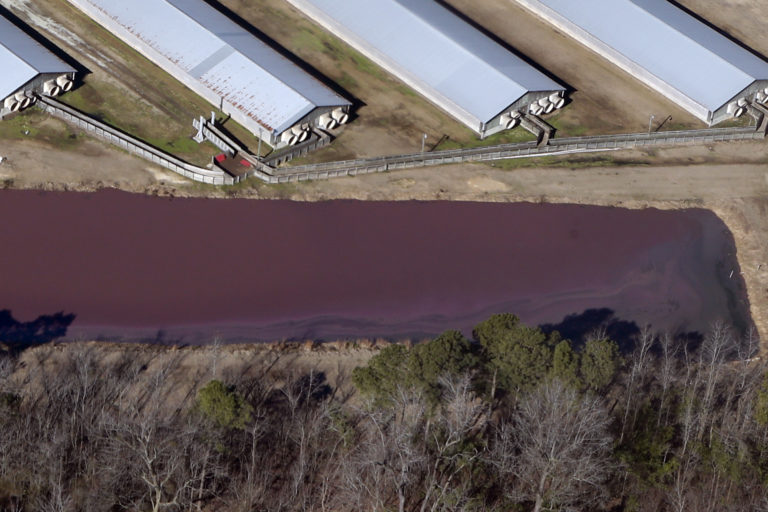North Carolina is No. 1 in a Dangerous Pollution Category
By: Ellen Simon

North Carolina is the top state in a category that poses a hazard to our soil, our air, and our water.
Thanks to the expansion of intensive hog, chicken, and turkey operations, North Carolina now has more tons of manure per acre of farmland than any other state.
That’s because most meat we eat comes from chicken, cattle, and hogs raised differently than they would have been fifty or sixty years ago.
Back then, diversified family farms raised a few pigs, chickens, or cows. Now, it’s not uncommon for a chicken operation to be raising 100,000 or more birds at a time, birds that generate a tremendous volume of waste.
Pigs and cattle are raised pretty much the same way: In massive numbers, in crowded barns, with too much waste to manage safely. The size of hog operations in the coastal plain grew by over 45 percent in the ten years ending in 2007. The roughly 10 billion gallons of waste North Carolina’s hogs produce each year is kept in unlined cesspools, then sprayed on cropland.
Historically, livestock waste was used as fertilizer. But these industrial-scale meat operations create more waste than nearby cropland can absorb.
North Carolina is now home, on any given day, to approximately 9 million swine, 776,000 thousand cattle, more than 161 million broiler chickens, and 16 million turkeys. Together, these animals produce about 147.5 million pounds of manure each day. That manure contains more than 1.24 million pounds of nitrogen and 434,000 pounds of phosphorus.
At North Carolina’s chicken and turkey operations, that waste is kept in enormous piles — piles vulnerable to rainstorms when left uncovered, as their contents can wash into nearby rivers, contributing to fish kills.
Most of the state’s hog operations are on the coastal plain, which has porous soil and a high water table. Operations regularly spray more phosphorus on the land than is necessary for plant growth. The runoff from spray fields overburdened with waste runs into our creeks, streams, and rivers contributes to dead zones.
Three key points to know about the environmental and health effects of current industrial meat operations, and what we can do about them:
1: Water pollution: A U.S. Geological Survey study, conducted in partnership with North Carolina’s Department of Environmental Quality, found that watersheds with industrial swine and poultry operations had higher pollution levels than watersheds without such operations.
The water pollution threat in North Carolina from hog waste cesspools is especially dire. Hurricane Florence in 2018 damaged at least six hog waste cesspools and caused approximately thirty-three to discharge waste into local waterways. During Hurricane Floyd in 1999, 26 hog cesspools ruptured and 45 others sustained damage, while at least 30,000 hogs drowned.
This is why hog operations should not be allowed to operate on the 100- and 500-year floodplains. These locations are simply too vulnerable to increasingly frequent and severe storms.
2: Ammonia emissions: The largest source of ammonia emissions in the U.S. is livestock agriculture. A study by Iowa State University found that just two chicken houses in western Kentucky emitted over 10 tons of ammonia in the year they were monitored. Ammonia, a gaseous form of nitrogen, has environmental effects, contributing to fish kills and dead zones in waterways. It also has health effects. Chronic exposure to ammonia is linked to asthma.
One solution to this environmental issue in North Carolina is to require industrial animal operations to report these hazardous emissions: a change Waterkeeper Alliance has long advocated.
3: Soil oversaturation: The system of waste management at industrial swine and poultry operations means that more phosphorus is applied to the soil than it can absorb.
The state, for the first time last year, under pressure from environmental groups including Waterkeeper Alliance and North Carolina riverkeepers, required hog operations to monitor phosphorus levels in the soil, and stop spraying waste on a field if the risk of phosphorus pollution is too high.
The North Carolina Farm Bureau, the trade group for the state’s agriculture industry, is fighting this new requirement. Keeping the requirement is important for water quality, since excess phosphorus contributes to algal blooms. For the health of our rivers, we need to keep it.